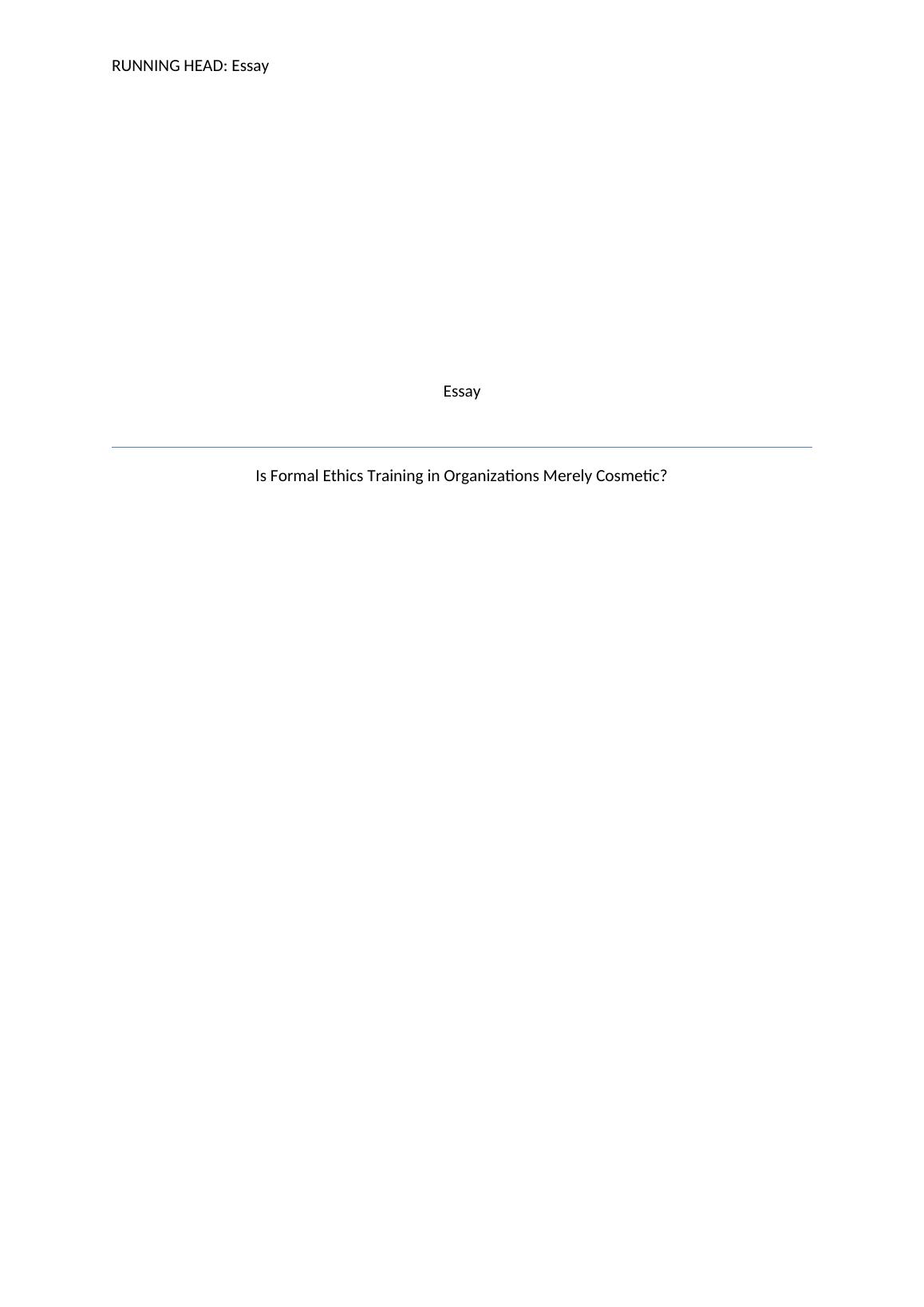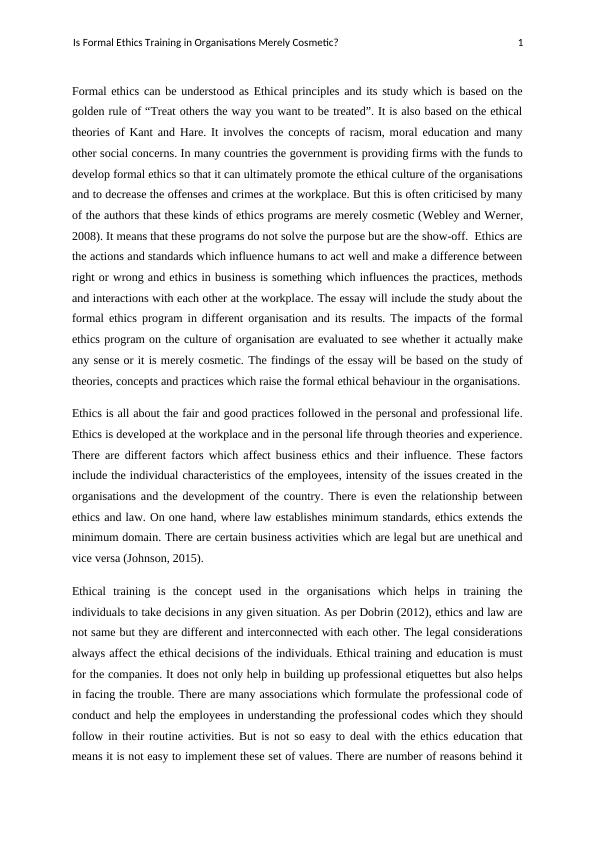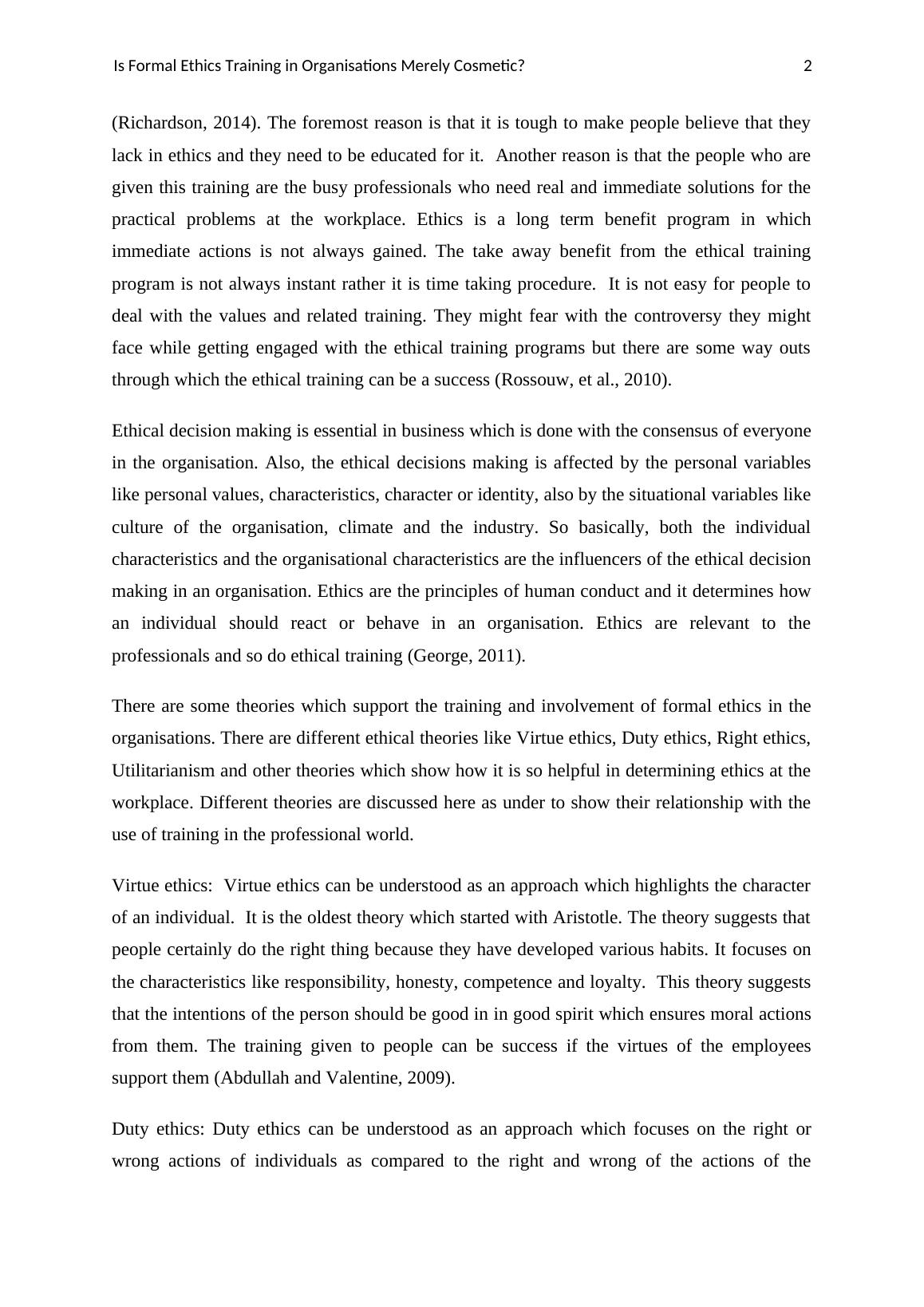BUSM 4403- Essay on Formal Ethics Program
Added on 2020-03-13
9 Pages3070 Words64 Views
RUNNING HEAD: EssayEssayIs Formal Ethics Training in OrganizationsMerely Cosmetic?

Is Formal Ethics Training in Organisations Merely Cosmetic? 1Formal ethics can be understood as Ethical principles and its study which is based on thegolden rule of “Treat others the way you want to be treated”. It is also based on the ethicaltheories of Kant and Hare. It involves the concepts of racism, moral education and manyother social concerns. In many countries the government is providing firms with the funds todevelop formal ethics so that it can ultimately promote the ethical culture of the organisationsand to decrease the offenses and crimes at the workplace. But this is often criticised by manyof the authors that these kinds of ethics programs are merely cosmetic (Webley and Werner,2008). It means that these programs do not solve the purpose but are the show-off. Ethics arethe actions and standards which influence humans to act well and make a difference betweenright or wrong and ethics in business is something which influences the practices, methodsand interactions with each other at the workplace. The essay will include the study about theformal ethics program in different organisation and its results. The impacts of the formalethics program on the culture of organisation are evaluated to see whether it actually makeany sense or it is merely cosmetic. The findings of the essay will be based on the study oftheories, concepts and practices which raise the formal ethical behaviour in the organisations.Ethics is all about the fair and good practices followed in the personal and professional life.Ethics is developed at the workplace and in the personal life through theories and experience.There are different factors which affect business ethics and their influence. These factorsinclude the individual characteristics of the employees, intensity of the issues created in theorganisations and the development of the country. There is even the relationship betweenethics and law. On one hand, where law establishes minimum standards, ethics extends theminimum domain. There are certain business activities which are legal but are unethical andvice versa (Johnson, 2015).Ethical training is the concept used in the organisations which helps in training theindividuals to take decisions in any given situation. As per Dobrin (2012), ethics and law arenot same but they are different and interconnected with each other. The legal considerationsalways affect the ethical decisions of the individuals. Ethical training and education is mustfor the companies. It does not only help in building up professional etiquettes but also helpsin facing the trouble. There are many associations which formulate the professional code ofconduct and help the employees in understanding the professional codes which they shouldfollow in their routine activities. But is not so easy to deal with the ethics education thatmeans it is not easy to implement these set of values. There are number of reasons behind it

Is Formal Ethics Training in Organisations Merely Cosmetic? 2(Richardson, 2014). The foremost reason is that it is tough to make people believe that theylack in ethics and they need to be educated for it. Another reason is that the people who aregiven this training are the busy professionals who need real and immediate solutions for thepractical problems at the workplace. Ethics is a long term benefit program in whichimmediate actions is not always gained. The take away benefit from the ethical trainingprogram is not always instant rather it is time taking procedure. It is not easy for people todeal with the values and related training. They might fear with the controversy they mightface while getting engaged with the ethical training programs but there are some way outsthrough which the ethical training can be a success (Rossouw, et al., 2010).Ethical decision making is essential in business which is done with the consensus of everyonein the organisation. Also, the ethical decisions making is affected by the personal variableslike personal values, characteristics, character or identity, also by the situational variables likeculture of the organisation, climate and the industry. So basically, both the individualcharacteristics and the organisational characteristics are the influencers of the ethical decisionmaking in an organisation. Ethics are the principles of human conduct and it determines howan individual should react or behave in an organisation. Ethics are relevant to theprofessionals and so do ethical training (George, 2011).There are some theories which support the training and involvement of formal ethics in theorganisations. There are different ethical theories like Virtue ethics, Duty ethics, Right ethics,Utilitarianism and other theories which show how it is so helpful in determining ethics at theworkplace. Different theories are discussed here as under to show their relationship with theuse of training in the professional world.Virtue ethics: Virtue ethics can be understood as an approach which highlights the characterof an individual. It is the oldest theory which started with Aristotle. The theory suggests thatpeople certainly do the right thing because they have developed various habits. It focuses onthe characteristics like responsibility, honesty, competence and loyalty. This theory suggeststhat the intentions of the person should be good in in good spirit which ensures moral actionsfrom them. The training given to people can be success if the virtues of the employeessupport them (Abdullah and Valentine, 2009).Duty ethics: Duty ethics can be understood as an approach which focuses on the right orwrong actions of individuals as compared to the right and wrong of the actions of the

End of preview
Want to access all the pages? Upload your documents or become a member.
Related Documents
BUSM3199 - Introduction to Governance & Ethics | RMITlg...
|10
|3059
|63
Significance of Review of Ethics Education within the Legal Professionlg...
|5
|1247
|153
Pharmacy Law and Ethicslg...
|6
|1271
|76
(PDF) Toward a Forensic Criminologylg...
|8
|2488
|39
Wider Professional Practice and Development in Education and Traininglg...
|17
|5539
|108
Wider Professional Practice in Education and Traininglg...
|20
|6573
|1
